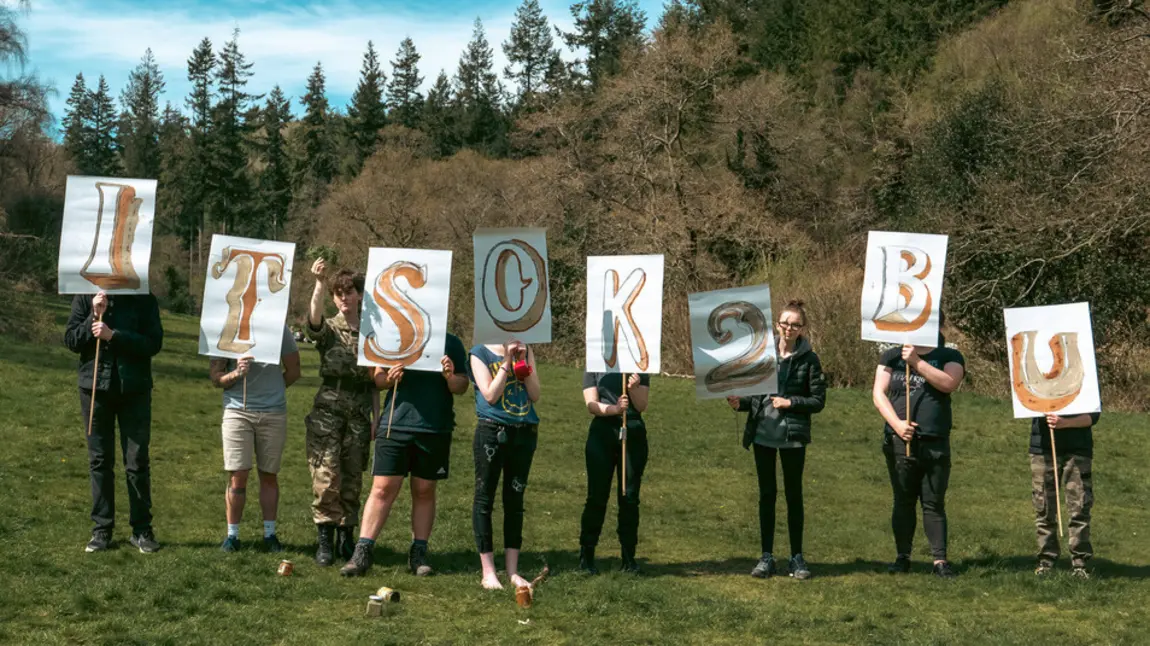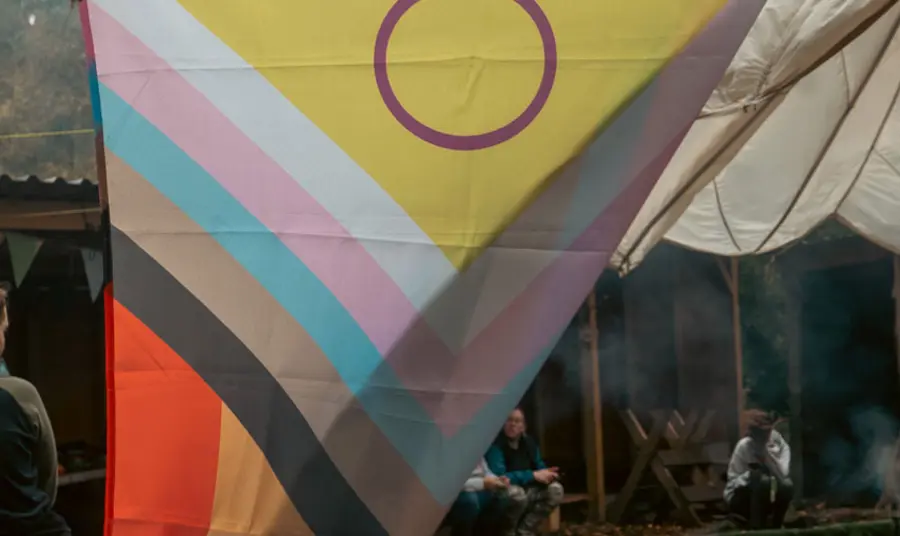Learnings from an LGBTQ+ project: creating pride in the countryside

It is a common misconception that there are very few LGBTQ+ people in rural areas. While some young queer people do move to towns and cities in search of respective communities, there are still many who live and work in rural places.
In a space where queer people can feel few and far between, those who took part in our work have flourished in the countryside and been unapologetically themselves. It has been an inspiring privilege to watch these young people bravely take on all the challenges thrown their way.
I work in conservation for the Quantock Landscape Partnership Scheme (QLPS) on the Quantock Hills, an Area of Outstanding Natural Beauty (AONB). This project, funded by The National Lottery Heritage Fund and hosted by Somerset County Council, aims to connect people and place.
Connecting with nature
Being out in nature has always been my safe space. When working in the woods or walking across the heath I’m not worrying about how I am perceived. Humans are just another species in the natural world.
The birds, bees and butterflies are not concerned with our concepts of sexuality or gender identity. It is my dream that all LGBTQ+ people feel this freedom when exploring the outdoors, so that, ultimately, we can all enjoy connecting more closely to nature.
When I started my role with QLPS, I had begun my transition journey but hadn’t yet ‘come out’ at work. It’s something that I felt I needed to do – to be as authentic as possible in my workplace if I wanted to create a safe space for all identities in the countryside.
Reaching LGBTQ+ communities
Engaging young people is a critical part of the QLPS. Early in our community engagement we approached our local LGBTQ+ support group, 2BU, whose values and ambitions we felt aligned with.
2BU’s membership includes young people living in rural contexts. They engage under-served and neurodiverse young people through their support service and share a love for the countryside. Working together increased the opportunities we could give young people to experience and connect with nature.
The key to engaging with this diverse group of young people was allowing them to craft their own experiences.
Exploring outdoors
We introduced this group of young people to practical conservation skills at Cothelstone Hill, where they coppiced hazel and built woodland habitats for the resident dormice. Through this work, the young participants contributed to our wildlife projects, furthering our understanding and support of wildlife around the AONB and ecology in general.
It was a big step, however, for these young people from 2BU to leave Taunton, a place where they felt safe and a sense of ownership. Asking them to venture out to the hills would ultimately be about creating a sense of ownership of another kind – a pride and autonomy in nature.
Whether coppicing hazel, or planting trees, the young people were having a lasting impact on their surroundings.
We also hosted activities for the 2BU group at the Woodland Play Centre, such as whittling and other nature crafts to build the young peoples' confidence. They felt safe in this space and that allowed us to push the boundaries and enter wilder spaces in our mission to connect with nature. Without these collaborations, the open countryside would seem alien and unfriendly.
In spring, during school holidays, we went out onto the Quantock Hills. We worked on placards for the Taunton Pride Parade using natural pigments from across the hills, redesigning the 2BU slogan and embedding it in the colours of the Quantocks.
The emphatic slogan ‘It’s OK 2BU’ became an emblem to represent what it means to occupy the Quantock Hills alongside all other communities.
Facing challenges
In the summer holidays, during Pride month, the 2BU young people camped with us on the hills, which for many of them was their first ever time doing so. We were faced with the normal challenges of the weather, but the young people also faced the added challenge of being without the safety of known environments.
Added to this, in a group of gender-diverse people, a toilet and shower block can pose a significant challenge. Many of the young people identify outside of the gender binary, but that often leaves only a disabled toilet for access which makes many feel uncomfortable and can lead to unnecessary confrontation.
I am endlessly proud of how the young people handled these challenges over the weekend. Our work aims to empower people to feel safe and supported, and to enjoy the freedom of the countryside. These moments, however hard, help to build relationships within our surroundings.
Forming partnerships
The key to engaging with this diverse group of young people was allowing them to craft their own experiences. 2BU's fearless leader, Lisa, has spent years building trust with the young people and she became our champion. She asked the young people to give the idea of QLPS a chance, and in exchange we would try our best to provide the sort of awesome nature adventures they wanted.
We regularly partner with local organisations, finding ways that complement each other, especially when we work in the same locality. Too many organisations can be territorial about audiences, especially when it comes to funding. However, sharing values, place and communities should be about collaboration, not competition.
I hope that, more and more, folk like these young people will feel welcome on the Quantock Hills and other countryside spaces through projects like this one.
Want to run your own project?
Explore some of the inspiring LGBTQ+ projects we have funded and take the next steps to starting your own.
Find out more about our available funding.



